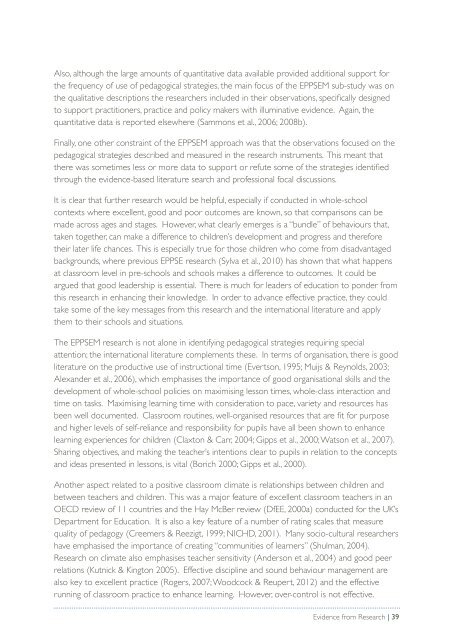Pearson-Exploring-Effective-Pedagogy-in-Primary-Schools
Pearson-Exploring-Effective-Pedagogy-in-Primary-Schools
Pearson-Exploring-Effective-Pedagogy-in-Primary-Schools
You also want an ePaper? Increase the reach of your titles
YUMPU automatically turns print PDFs into web optimized ePapers that Google loves.
Also, although the large amounts of quantitative data available provided additional support forthe frequency of use of pedagogical strategies, the ma<strong>in</strong> focus of the EPPSEM sub-study was onthe qualitative descriptions the researchers <strong>in</strong>cluded <strong>in</strong> their observations, specifically designedto support practitioners, practice and policy makers with illum<strong>in</strong>ative evidence. Aga<strong>in</strong>, thequantitative data is reported elsewhere (Sammons et al., 2006; 2008b).F<strong>in</strong>ally, one other constra<strong>in</strong>t of the EPPSEM approach was that the observations focused on thepedagogical strategies described and measured <strong>in</strong> the research <strong>in</strong>struments. This meant thatthere was sometimes less or more data to support or refute some of the strategies identifiedthrough the evidence-based literature search and professional focal discussions.It is clear that further research would be helpful, especially if conducted <strong>in</strong> whole-schoolcontexts where excellent, good and poor outcomes are known, so that comparisons can bemade across ages and stages. However, what clearly emerges is a “bundle” of behaviours that,taken together, can make a difference to children’s development and progress and thereforetheir later life chances. This is especially true for those children who come from disadvantagedbackgrounds, where previous EPPSE research (Sylva et al., 2010) has shown that what happensat classroom level <strong>in</strong> pre-schools and schools makes a difference to outcomes. It could beargued that good leadership is essential. There is much for leaders of education to ponder fromthis research <strong>in</strong> enhanc<strong>in</strong>g their knowledge. In order to advance effective practice, they couldtake some of the key messages from this research and the <strong>in</strong>ternational literature and applythem to their schools and situations.The EPPSEM research is not alone <strong>in</strong> identify<strong>in</strong>g pedagogical strategies requir<strong>in</strong>g specialattention; the <strong>in</strong>ternational literature complements these. In terms of organisation, there is goodliterature on the productive use of <strong>in</strong>structional time (Evertson, 1995; Muijs & Reynolds, 2003;Alexander et al., 2006), which emphasises the importance of good organisational skills and thedevelopment of whole-school policies on maximis<strong>in</strong>g lesson times, whole-class <strong>in</strong>teraction andtime on tasks. Maximis<strong>in</strong>g learn<strong>in</strong>g time with consideration to pace, variety and resources hasbeen well documented. Classroom rout<strong>in</strong>es, well-organised resources that are fit for purposeand higher levels of self-reliance and responsibility for pupils have all been shown to enhancelearn<strong>in</strong>g experiences for children (Claxton & Carr, 2004; Gipps et al., 2000; Watson et al., 2007).Shar<strong>in</strong>g objectives, and mak<strong>in</strong>g the teacher’s <strong>in</strong>tentions clear to pupils <strong>in</strong> relation to the conceptsand ideas presented <strong>in</strong> lessons, is vital (Borich 2000; Gipps et al., 2000).Another aspect related to a positive classroom climate is relationships between children andbetween teachers and children. This was a major feature of excellent classroom teachers <strong>in</strong> anOECD review of 11 countries and the Hay McBer review (DfEE, 2000a) conducted for the UK’sDepartment for Education. It is also a key feature of a number of rat<strong>in</strong>g scales that measurequality of pedagogy (Creemers & Reezigt, 1999; NICHD, 2001). Many socio-cultural researchershave emphasised the importance of creat<strong>in</strong>g “communities of learners” (Shulman, 2004).Research on climate also emphasises teacher sensitivity (Anderson et al., 2004) and good peerrelations (Kutnick & K<strong>in</strong>gton 2005). <strong>Effective</strong> discipl<strong>in</strong>e and sound behaviour management arealso key to excellent practice (Rogers, 2007; Woodcock & Reupert, 2012) and the effectiverunn<strong>in</strong>g of classroom practice to enhance learn<strong>in</strong>g. However, over-control is not effective.Evidence from Research | 39


